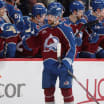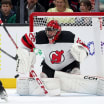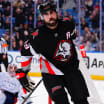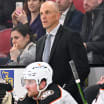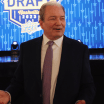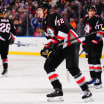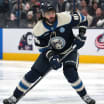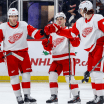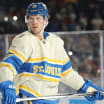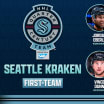NHL.com's Q&A feature called "Five Questions With …" runs every Tuesday. We talk to key figures in the game and ask them questions to gain insight into their lives, careers and the latest news.
The latest edition features Boston Bruins coach Bruce Cassidy:
Five Questions with Bruce Cassidy
Bruins coach on replacing Claude Julien, special teams success, more
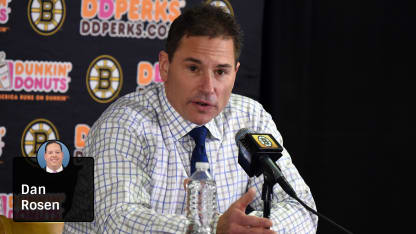
Bruce Cassidy has had a successful 20-game run as Boston Bruins coach, putting them in position to qualify for the Stanley Cup Playoffs, in part because he didn't need to waste time trying to convince the veteran players to buy into what he was trying to sell.
The Bruins are 13-7-0 since Cassidy replaced Claude Julien on Feb. 7. They enter their game against the Nashville Predators at TD Garden on Tuesday (7 p.m. ET; SN1, SNO, TVA Sports, NESN, FS-TN, NHL.TV) in position for the second wild card into the playoffs from the Eastern Conference.
Cassidy's familiarity with the Bruins players can't be undersold.
He coached many of the players, including forward Brad Marchand and goalie Tuukka Rask, during his eight seasons with Providence of the American Hockey League, the Bruins' top affiliate.
Cassidy started working with forwards Patrice Bergeron, David Krejci and David Backes at the start of this season, when he was Julien's assistant in charge of the power play. He also ran the defense, which means he worked daily with captain Zdeno Chara.
"Being around did help me tremendously," Cassidy said. "I think coming off the street would have been difficult. I'm not saying coaches can't do it, but for me it was a big advantage to come in and say, 'We're a good defensive team, let's build our offensive game here. These games we're losing because we can't quite finish, let's try this and maybe it'll help us finish better.' They bought into it."
The Bruins have significantly improved their offensive game under Cassidy.
They're averaging 3.55 goals per game and are 15-for-57 on the power play (26.3 percent) since the coaching change. They were averaging 2.6 goals per game and were 33-for-172 (19.2 percent) on the power play in the first 55 games under Julien.
Marchand, who has moved to the front of the net on the power play, has 14 goals and 25 points under Cassidy. He had 55 points in 55 games under Julien.
Boston is in control of its own playoff destiny and could be third in the Atlantic Division when the games are finished Tuesday; a win coupled with a regulation loss by the Toronto Maple Leafs would move the Bruins up. Toronto plays the Florida Panthers at Air Canada Centre.
Cassidy talked about the Bruins' offensive game and the remainder of the Bruins' regular-season schedule in a Q & A with NHL.com.
Here are Five Questions with … Bruce Cassidy:
The numbers are what they are since you took over, and they're good. It's 20 games, you're 13-7-0. Goals are up. Power play is better. What has changed since you took over for Claude Julien? What is different about the Bruins?
"Well, in that span we've focused more on offense, that side of the puck. Certainly with our power play, we've evolved as this year has went on and Brad Marchand has had a lot to do with that in front of the net. [David] Pastrnak's shot has developed. So we've got different weapons on it. [Bergeron] has always been good in the bumper. I think [Torey] Krug has done a better job with his shot selection and distributing the puck, shooting for tips, etc. We're not one-dimensional. But 5-on-5, I think it's a lot to do with we've kept pucks going toward the net down low, more half-wall attacks, more plays down low. We've emphasized more of that than always going low to high with it. We're trying to get the guys to use more of their skill set, separate down low, especially with man-to-man coverages. So I think our quality of chances, if you look at that stat-wise, has gone up quite a bit in the last 20 games. Much more slot generated chances than low to high. Better chances with skilled players usually leads to more goals."
Is what you just outlined, attacking in the slot area, off the half-wall, something you guys as a staff were emphasizing from the start of the season, or is this a change that when you took over you said, 'OK, I've got the job now, I'm the leading man here, I've got the call and I'm going to make these changes?' How did that work?
"Well, two-fold; I ran the D so there wasn't a lot of input in the offensive zone play. It wasn't my area of responsibility. Clearly if I'm asked I'm going to offer an opinion, but being new to it I kind of kept my nose out of it and tried to worry about shot suppression. Now, I did have the power play and around Christmas when we weren't doing very well, we sat down and I had more input on changing the units, who was on which unit. Obviously when you're the head guy, practice time becomes your baby and you can put as much or as little as you want into it. I've always been a special teams focused guy, especially power play, and whether it's just power play or small ice games that benefit your power play. I've always believed in building those into practice, those little small ice games around the net, whether it's the start of practice or the end of practice. I think it helps 5-on-5 and I think it helps the power play. So that part of it, the offensive part of it, certainly was more my influence. When I took over, I wanted to put an emphasis on it because I didn't think we were scoring enough and we weren't generating enough high end chances for our talent level. Then I was encouraging the guys to use it."
Take me through your mindset as an assistant coach who sees things offensively that aren't working and might have ideas on how to fix them, but he's running the D and he has to focus on that and worry about that. Was it frustrating for you? Did you want to speak up?
"If we sat down as a group and talked about it, I would offer that I thought we were going low to high a little too often because we have a lot of defensive-minded defenseman. With the exception of Torey Krug most of those guys are stay-at-home. Now, I know [Chara] has both. There are certainly guys with offensive ability. I don't want to paint them all with the same brush, that's not fair. But in general, the defense corps as a group is more defensive. That's why our PK is very strong. I think we're shot blockers, good sticks, very heavy. But going low to high, I believe nowadays the way teams play and block shots and front pucks it's a real skill to get a puck to the net nowadays. There is certainly some luck involved some days, but I think it's a skill and it's an underrated skill nowadays. I just didn't think it was one of our strengths with our guys. So I would offer the suggestion of, 'Hey, why don't we play down low more?' But that was part of those roundtable discussions. For the most part my mindset was, 'That's just what I think, I don't know if it will really help.' Joe Sacco was running the forwards and [Jay Pandolfo] was a forward. That was kind of their neck of the woods.
"Now the power play, yes, I always had opinions, it was just meshing with Claude, what players go on which units. I've also always been a believer that the net-front guy in today's NHL does not have to be a [Todd] Bertuzzi or a [Johan] Franzen, the big-bodied screener. I think effective power plays are when guys can make plays around the net. I'll use Columbus, because they were so hot at the start of the year. Sam Gagner, Nick Foligno and Cam Atkinson ran really good low triangle plays. They're not the biggest guys. Zach Parise, I've always admired his skills around the net. He's a guy that is tenacious, can tip pucks and recover pucks and screen goalies because he's smart, not huge or big in stature. It's more about his IQ around that area. And that was my input. Sometimes as an assistant you get your way and sometimes you don't. When it's a head coach, it's on you. That's why we moved Marchand into that role. I had to sort of sell him on it and eventually I got my way and I think he's really helped our power play.
"But the rest of it, no, it was my first year in the NHL in a long time. So trust me, I was more concerned about my job description, which was defending our zone, making a good first pass, breakouts. I had my hands full."
If we look recently at the offensive numbers we see four goals against L.A., six against Dallas, four against Arizona, six against Detroit, another six-spot against Vancouver and five against Calgary. But then you lost four in a row, allowing 20 goals in the process. Did you go too far over the line with the push for offense that it impacted your defense? Is that why you played a lock-it-down type of game against the Islanders on Saturday to win 2-1? Is that how you need to play the rest of the way?
"I would say yes and no. If you're going to have your D involved and you're going to ask your players to be a little more 1-on-1 down low you're building some risk into your game, so you have to be careful that your D are joining at the right time. So things are going well and now they're going all the time and they think because things are going well it's going to be like that all the time. They start making some decisions that get riskier and riskier, so we had to dial that back in. You go up to Edmonton and you lose 7-4 and everyone is like, 'Wow, the Bruins gave up a touchdown, what's going on?' Some of that, to be quite honest, was just our lack of attention to detail in the slot. Edmonton was playing well and their big bodies were just out-willing us in the slot. I can't even call it risk; they were just better than us in front of our net, harder than us. Now it's talked about a little bit more. We played well in Toronto. It was a good game, could have went either way. Against Ottawa, we had trouble scoring on Anderson. We played very well, but all of a sudden you're on a losing streak and you have to be careful that you're not trying to outscore teams to get out of it. I think it's easier to gut out a win than to try to outscore a team. I guess it could go either way, but to me it's a better formula so that was our game plan in New York. Hopefully from there we get back to being a good offensive team without losing our defensive structure. That's what every team wants. We're no different."
Six out of your last seven games are at home, but home hasn't been so friendly to the Bruins this season. You are 19-16-0 at home. Any reason why you think it's been occasionally a struggle on home ice and is it an advantage to have six of seven at home considering that?
"It's an advantage. If we're just going back 10 games, we have won seven of them. Now we've lost the last two. I did not think we played well against Tampa, well enough to win (6-3 loss). The other games, we played well. We played very well against Ottawa, didn't score enough. We played very well against the Rangers and lost the game 2-1 because [Henrik] Lundqvist was unbelievable. So our home games have been good in terms of our energy. I focus more on our starts at home, making sure we're on our toes, putting teams on their heels, how we manage the puck early. I think that's helped to try to be the more energetic team right out of the gate. The crowd is into it and if for whatever reason the opponent isn't ready and we are, that could go a long way. It's just so much easier to play with the lead than chasing the game, especially with the schedule the way it is this year. Teams always seem to be some level of fatigued coming in because they're traveling or they have three in four. It just seems if you can get a lead, it makes the game so much easier. It has worked out well. Now, our last game at home not so much, so we want to correct that, and this game is a good example. We have a team coming in here in the Predators that are playing back to back. We've got to use that to our advantage."

